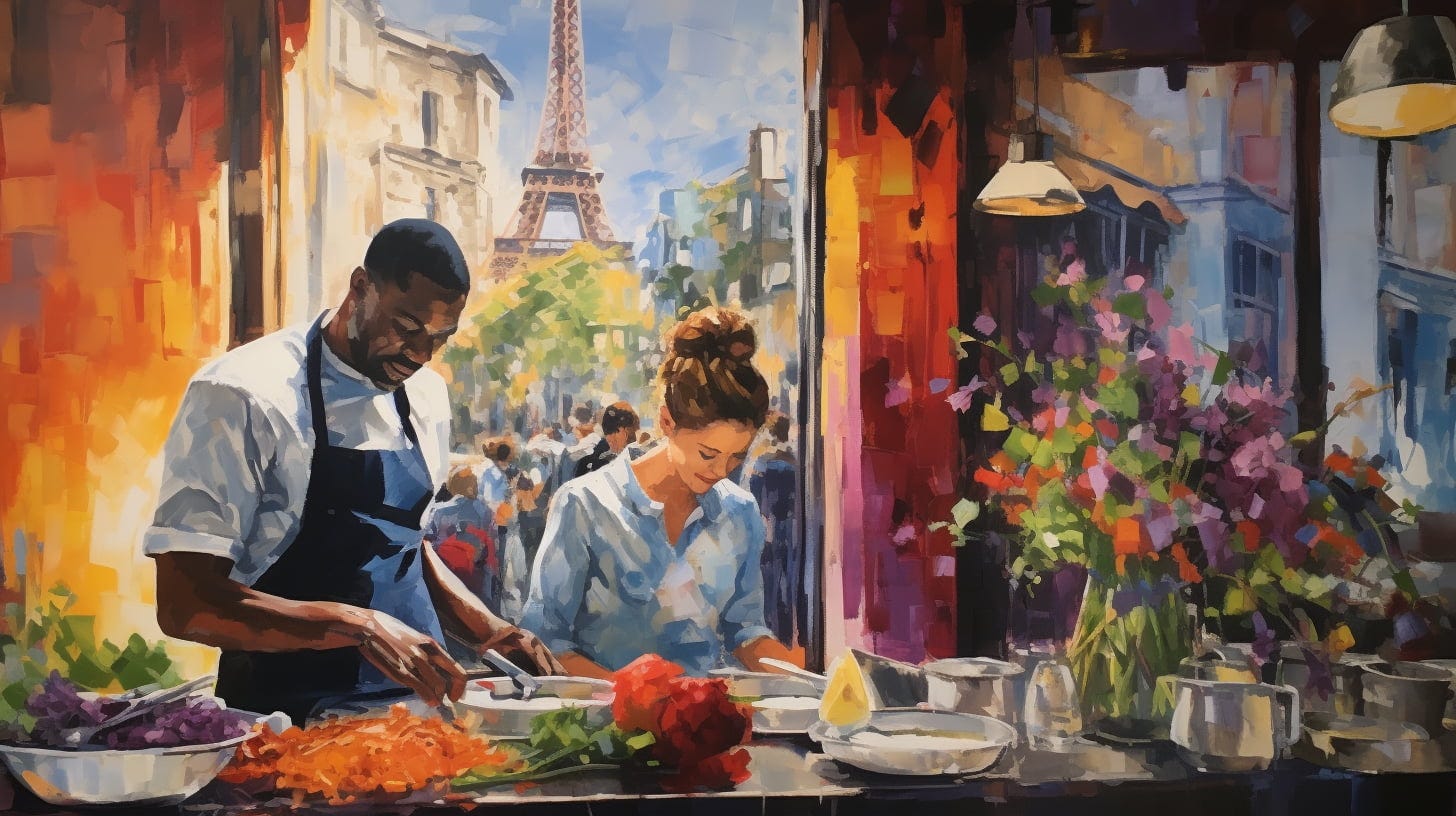4. Taste of Redemption
In the heart of Paris, nestled among historic cobblestone streets and age-old establishments, stood "Éclat Culinaire" - a restaurant that was the epitome of culinary excellence. Its owner and head chef, Laurent Dubois, was a master of his craft, with his name echoing in the hallowed halls of the culinary world.
By 2025, he had reached the pinnacle of success. Every dish Laurent crafted was an orchestration of flavors, textures, and memories, always leaving his guests yearning for another bite. At the heart of his menu were exquisite meats and seafood, sourced from every corner of the world.
But that year, a shadow cast its gloom over the world - another pandemic, one more deadly and swift than those in the past. Paris, like other global hubs, went under a strict lockdown. "Éclat Culinaire" had to shut its ornate doors, and the kitchen, once bustling with activity, fell silent. Laurent was shattered. A lifetime of dedication seemed to crumble in the face of an invisible adversary.
As days morphed into weeks, Laurent, usually enveloped in the aromas of his kitchen, had time to indulge in the world outside. It was during one of these moments, sifting through international news, that he stumbled upon an investigative piece from an independent journalist. The article revealed that the origin of the pandemic wasn't some distant wet market or natural reservoir but an industrial animal farm in the United States.
His initial reaction was fury. How could irresponsible practices, oceans away, shutter his world? But as he delved deeper into the rabbit hole of industrial farming, Laurent’s anger transformed into introspection. The animals in these factories lived in nightmarish conditions, not for necessity, but to satisfy humanity's insatiable appetite for pleasure. He realised he wasn't just a bystander; he was a participant. His acclaimed dishes, with their premium meats and decadent flavors, were an endorsement of a system that put pleasure over ethics.
The realisation was a harsh mirror to face. Laurent began exploring alternatives, diving into vegetarian and vegan culinary arts. He researched ancient culinary traditions, seeking wisdom in plant-based diets, grains, and legumes.
Months went by, and the pandemic slowly started receding. The world began its slow return to normalcy. But for Laurent, the old "normal" was a path he could no longer tread. He transformed his closed restaurant into a community kitchen, serving meals to the needy, ensuring that none went hungry in these challenging times. Each dish was plant-based, drawing inspiration from his recent explorations.
As Paris reopened, so did "Éclat Culinaire", but it was reborn. The new menu was a tribute to the planet, a love letter to ethical eating. Laurent's culinary prowess shone brighter as he crafted dishes that were not just delectable but also compassionate. The initial skepticism from his regulars was quickly replaced with admiration. Laurent's journey was contagious, and soon other restaurants began reevaluating their menus.
Years later, Laurent released a book, chronicling his transformation and revelations. It became a beacon for chefs and foodies around the world. But the most touching transformation was a personal one. His daughter, Céline, inspired by her father’s journey, became an advocate for sustainable and ethical eating among the youth.
In the heart of Paris, "Éclat Culinaire" stood not just as a culinary destination but as a testament to the fact that change, no matter how daunting, begins from within. And sometimes, in the face of adversity, the soul finds its true purpose.
Humanitas et Machina: This series of fictional short stories aims to bring visions of hope in the face of humanity’s biggest challenges while also exploring the risks and potential of a future with AI. All stories are co-creations between man and machine. All images are AI generated. Find out more about the project.
This story started off with the theme of a pandemic and while the initial story was quite nicely written, it was largely a parallel of the Covid-19 pandemic. I wanted to create a more unique story for a possible future pandemic and so seeded the idea that it originated in a farm, since this is the origin of a large number of new infectious diseases and so is a likely source for future pandemics. I struggled to get it to break out of the assumption that it would originate in China or a developing country and so I specified the USA as the origin. I also specified that the story should have a lead male character in Paris to give the story international breadth.
This helped form an interesting story concept of a chef in Paris who was impacted by the pandemic, but some early versions felt very strongly like vegan propoganda. As much as I agreed with the points raised in the story, I felt a gentler approach would be more impactful, but when I asked it to dial it down, the pendulum swung the other way and it sounded like a greenwashing campaign for a typical high end French restaurant. A lot of back and forth was required to gradually adjust the balance.
When I came to generated the image, I found it relatively easy to create attractive oil paintings depicting Parisian restaurants serving healthy food, but by default all chefs were white. Having observed in my own experience that Paris is extremely multicultural, I simply added the word ‘multi-cultural’ to the prompt and generated images that felt more in tune with modern Paris and with the story itself.




